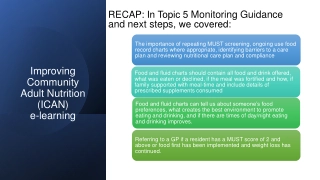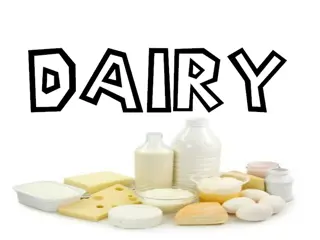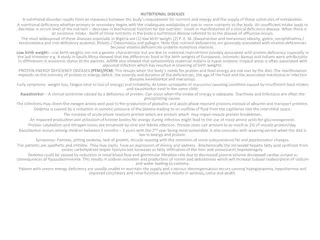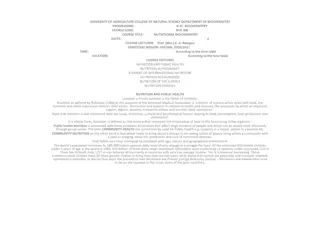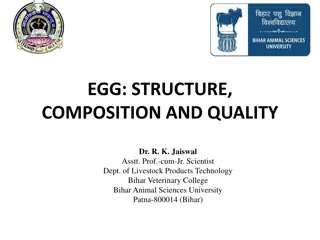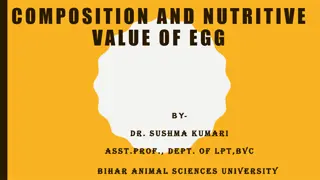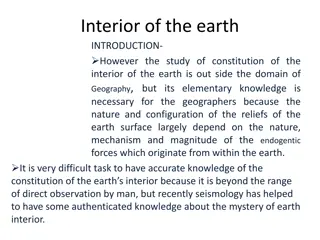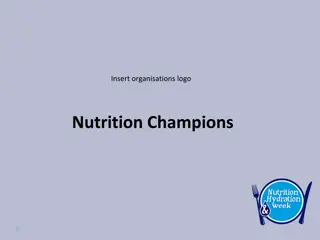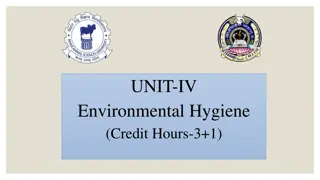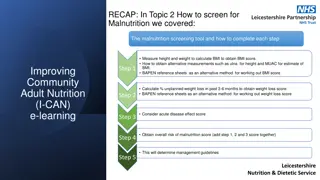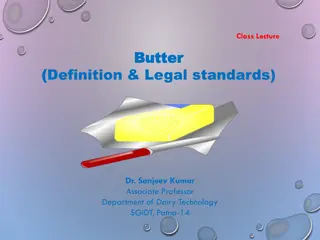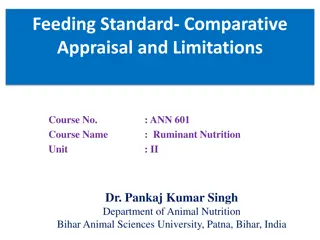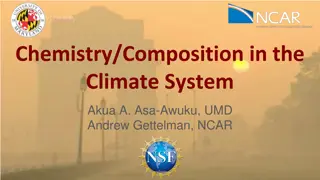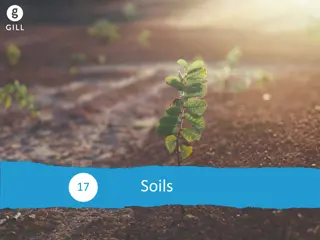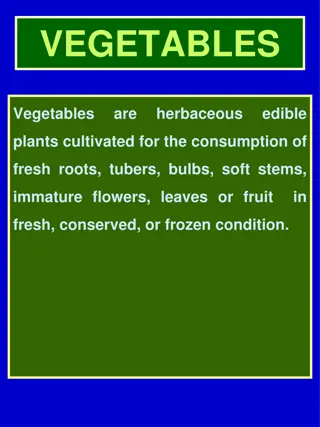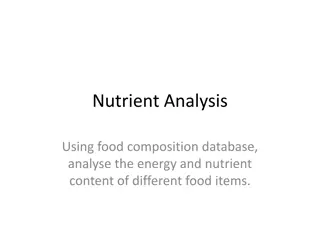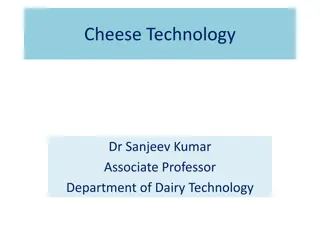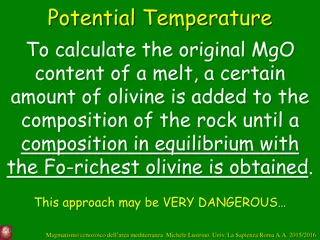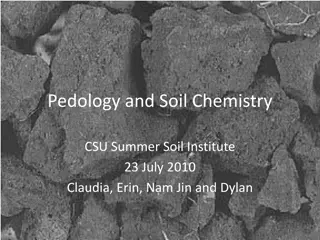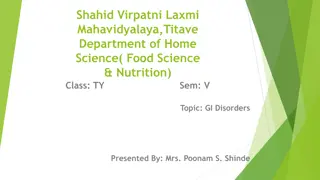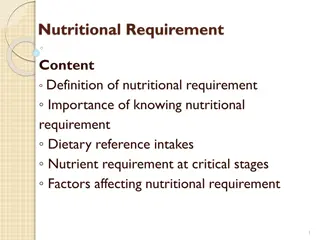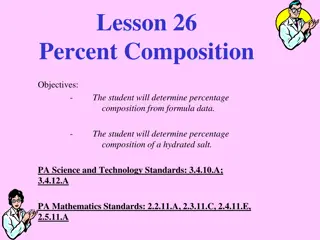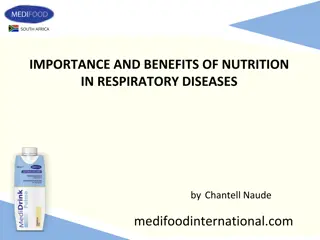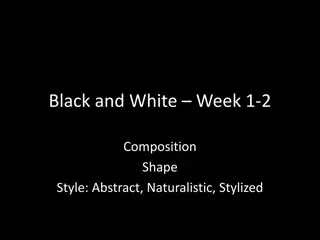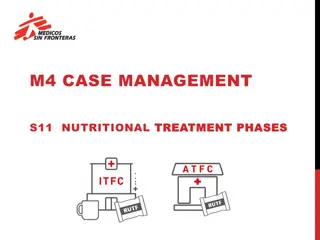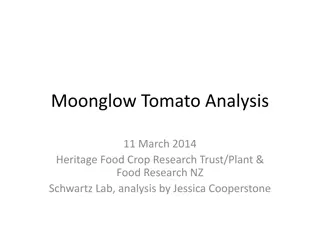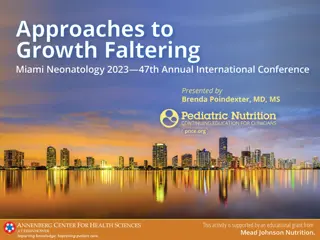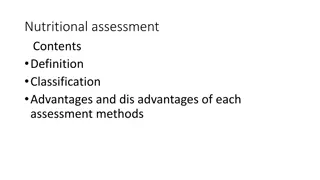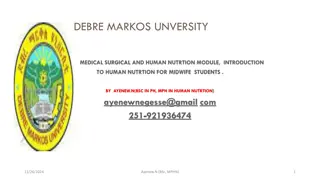Importance of Monitoring Guidance in Nutritional Care
This recap covers the significance of regular screening, using food record charts, identifying barriers to care plans, and reviewing nutritional compliance. It emphasizes the ICAN e-learning module and the key factors influencing nutritional care. The content highlights the importance of adequate fl
0 views • 16 slides
Insights into Milk Composition and Processing
Worldwide, milk is collected from various animals such as cows, goats, sheep, yaks, and water buffalo. The composition of milk includes water, lactose, butterfat, protein, and minerals, each playing a vital role in its nutritional value. The butterfat content determines the richness of dairy product
7 views • 41 slides
Exploring the Composition of Earth's Oceans
Delve into the composition, location, and subsurface topography of the world's oceans, discovering the chemical makeup of ocean water and its vast salt content. Uncover fascinating facts such as how the salt in the oceans could create a 500-foot thick layer if spread over Earth's land surface. Engag
1 views • 16 slides
Principles of Architecture: Unity, Contrast, Mass Composition
Explore the fundamental principles of architecture focusing on unity, contrast, and mass composition. Unity emphasizes harmony among building elements, contrast adds interest without disrupting unity, and mass composition involves arranging shapes in a harmonious way. Proportion and scale play key r
0 views • 24 slides
Overview of Nutritional Diseases and Disorders
Nutritional diseases arise from imbalances between the body's nutrient and energy requirements and their supply. Nutritional deficiencies can lead to clinical diseases, while excessive intake can result in diseases of affluence. Common nutritional disorders include low birth weight, PEM, obesity, go
4 views • 6 slides
Understanding Nutritional Biochemistry: A Comprehensive Overview of Nutrition and Public Health
Nutrition, as defined by Robinson, explores the relationship between food and the human body's functioning. This course delves into key topics such as nutrition in pregnancy, childhood, and the elderly, as well as nutrition-related diseases. It emphasizes the importance of public health nutrition in
1 views • 7 slides
Understanding Atmosphere Composition and Structure in Climatology
The study of climatology, focusing on the atmosphere, is presented by Dr. Banashree Saikia, covering topics such as atmospheric composition, insolation, temperature variations, atmospheric pressure, wind systems, atmospheric moisture, climatic classification, cyclones, and monsoons. The atmosphere,
1 views • 9 slides
Egg: Structure, Composition, and Quality Insights
Egg is a complete food enjoyed worldwide, with hen and duck eggs being popular choices. This article delves into the structure and composition of eggs, highlighting the shell, egg white, and yolk. The shell, comprising calcium carbonate, acts as a protective barrier. Egg white is rich in protein, wh
1 views • 14 slides
Nutritive Value and Composition of Eggs by Dr. Sushma Kumari
The composition and nutritive value of eggs, as presented by Dr. Sushma Kumari from Bihar Animal Sciences University, cover various aspects including the physical composition of eggs, the composition of an eggshell, and the chemical composition of eggs. The presentation delves into details such as t
0 views • 19 slides
Understanding the Composition of Earth's Interior: Insights from Density, Pressure, and Temperature
The constitution of the Earth's interior plays a crucial role in shaping the surface features we observe. Although direct observation is challenging, seismic studies offer valuable insights. The density, pressure, and temperature within the Earth provide essential clues to its composition. Rocks' de
0 views • 14 slides
Nutrition Champions: Improving Nutritional Care in Health and Social Settings
Nutrition Champions play a vital role in promoting food and drink as essential components of care packages in various settings. Their goal is to enhance nutritional and hydration care, share best practices, facilitate behavior change, and improve access to healthy food and fluids. The content discus
1 views • 21 slides
Understanding Environmental Hygiene: Air Pollution and Composition of Air
The content delves into the concept of atmospheric pollution, the composition of pure and impure air, sources of air pollution, and the zones of the atmosphere. It highlights the detrimental effects of pollutants on health and the environment, emphasizing the importance of environmental hygiene. The
1 views • 27 slides
Understanding Malnutrition Screening and Nutritional Care Planning
In this overview, discover the process of screening for malnutrition, including calculating BMI, assessing weight loss, and determining overall malnutrition risk. Explore how to create a nutritional care plan based on the MUST score and set appropriate nutritional aims for patients.
0 views • 12 slides
Understanding Moles and Formula Mass in Chemistry
Dive into the world of moles, Avogadro's number, and formula mass calculations in chemistry. Learn how to convert moles to grams, grams to moles, and determine the number of atoms using Avogadro's number. Explore the concepts of formula mass and percentage composition to understand the composition o
0 views • 19 slides
Enhancing Nutritional Security in SADC Communities through Sugar Fortification
Nutritional security is crucial for overall well-being, and this presentation explores the significant role of sugar fortification in improving micronutrient intake and combating malnutrition in SADC regions. Insights into the current status quo, strategies for enhancing micronutrient intake, and th
0 views • 15 slides
Understanding Butter: Definition, Standards, and Composition
Explore the definition of butter according to FSSAI standards, including its composition, permitted additives, and classifications based on acidity, salt content, end-use, and manufacturing practices. Discover the nutritional composition and fatty acid profile of butter along with essential informat
0 views • 10 slides
Understanding Feeding Standards in Ruminant Nutrition
Feeding standards play a crucial role in determining the nutritional needs of animals for optimal health and productivity. They consider factors like productivity, product composition, and physiological conditions, guiding effective nutritional management. Despite their usefulness, feeding standards
0 views • 8 slides
Nutritional Recommendations for Type 2 Diabetes Management
Regularity and consistency in diet are crucial for individuals with type 2 diabetes to maintain stable blood sugar levels. The new nutritional pyramid recommended by the Ministry of Health of the Republic of Lithuania emphasizes the importance of balanced nutritional choices for managing diabetes. N
0 views • 15 slides
Secure Composition of Key Exchange Protocols
Explore the game-based composition approach for key exchange protocols, focusing on ensuring security in compositions with arbitrary tasks and the universal composability of protocols. Delve into the Bellare-Rogaway security model and the details of security games in protocol analysis. Understand ke
0 views • 25 slides
Understanding Chemistry and Composition in the Climate System
Dive into the intricate relationship between chemistry and composition in the climate system, exploring topics such as radiative effects, stratosphere-troposphere coupling, aerosol-cloud interactions, and the impact of various gases and particulates on radiative forcing. Discover how changes in comp
0 views • 25 slides
Understanding Soil Composition and Importance
Explore the world of soil and its significance as a natural resource by discovering its composition and how it affects plant growth. Learn about the main ingredients of soil, its permeability, and the role of water, air, and organic matter. Gain insights into how soil supports plant life through lea
1 views • 30 slides
Comprehensive Guide to Nutritional Value and Composition of Vegetables
Vegetables are herbaceous edible plants cultivated for consumption in various forms like fresh, cooked, or as salads. They are rich in essential nutrients such as protein, carbohydrates, vitamins, and inorganic salts. The tables provided detail the main nutrient constituents and composition of vario
1 views • 25 slides
Nutrient Analysis Using Food Composition Database
Analyze the energy and nutrient content of different food items by following guidelines that include obtaining ingredient lists, converting units, calculating nutrients, and dividing by serving size. Explore the nutritional profiles of Egg Waffle and Bubble Tea, including energy, protein, carbohydra
0 views • 6 slides
Understanding Cheese: Technology, Classification, Legal Standards, and Nutritional Value
Dive into the world of cheese with insights on its technology, definitions, classification, legal standards, and nutritional composition. Discover how cheese is made, categorized, regulated, and its key nutritional components.
0 views • 16 slides
Understanding Olivine Equilibrium in Calculating Original Magma Composition
The process involves analyzing olivine in basaltic rocks, selecting olivine with the highest Fo content, calculating the melt composition in equilibrium with this olivine using the distribution coefficient (KD), and determining the potential temperature (Tp) based on the MgO content. The distributio
0 views • 30 slides
Soil Chemistry and Mineralogy Analysis at CSU Summer Soil Institute
Explore the comprehensive analysis of soil chemistry, texture, and mineralogy conducted at the CSU Summer Soil Institute in July 2010. The study delves into pedology, elemental composition, particle size distribution, X-ray diffractometry, and mineralogical composition of various soil samples. Detai
0 views • 22 slides
Optimizing Nutritional Support for Upper GI Cancer Patients: Insights and Strategies
High prevalence of malnutrition in upper GI cancer patients highlights the importance of early nutritional screening and intervention. The role of prehab clinics in enhancing outcomes is gaining momentum. Insights from previous experience in nutritional screening reveal both advantages and challenge
2 views • 15 slides
Understanding Peptic Ulcers: Causes, Symptoms, and Nutritional Management
Shahid Virpatni Laxmi Mahavidyalaya conducted a presentation on gastrointestinal (GI) disorders, focusing on peptic ulcers. The content covers the etiology, symptoms, and nutritional management of peptic ulcers, emphasizing the importance of proper diet in managing this condition. Peptic ulcers, cha
0 views • 8 slides
Understanding Nutritional Requirements and Their Impact
Exploring the definition and importance of nutritional requirements, as well as the Dietary Reference Intakes, critical stages for nutrient needs, and factors influencing nutritional requirements.
0 views • 174 slides
Understanding Body Composition: Types, Measurement Methods, and Impacts on Health
Body composition is a key aspect of overall health and fitness. It involves understanding different somatotypes - ectomorph, endomorph, and mesomorph, as well as distinguishing between lean body mass and body fat. Various methods such as underwater weighing, electrical impedance, skinfold measuremen
0 views • 26 slides
Understanding Percentage Composition in Chemistry
Percentage composition is crucial in determining the elemental composition of compounds. This lesson explains how to calculate percentage composition using molar masses, illustrated with examples like copper sulfide. It also delves into hydrated salts and their significance in chemistry. Students wi
0 views • 22 slides
Importance and Benefits of Nutrition in Respiratory Diseases
Nutrition plays a crucial role in respiratory diseases such as COPD and CF, with malnutrition affecting a significant percentage of patients. Poor nutritional status is linked to increased morbidity and mortality in these patients, impacting pulmonary health and muscle function. MediDrink Pulmo offe
0 views • 7 slides
Understanding Composition in Art: Techniques and Examples
Explore the concept of composition in art through various styles such as abstract, naturalistic, and stylized representations. Learn about the vocabulary and skills necessary for effective composition, with examples from renowned artists like Leonardo da Vinci, Georges Seurat, and more. Discover how
0 views • 43 slides
Improving Patient Outcomes through Frailty Support Project
This project, funded by the Carmarthenshire Intermediate Care Fund, aimed to provide flexible, person-centered care to support patient mobility and nutritional needs. Frailty workers implemented various strategies such as frailty snack boxes, daily frailty logs, grip strength assessments, and nutrit
0 views • 8 slides
Understanding Nutritional Treatment Phases in Pediatric Malnutrition
This session covers the different phases of nutritional treatment in pediatric malnutrition programs, focusing on objectives, specifics, and criteria for transitioning between phases. An illustrative case of Annika, a 3-year-old in the Transition Phase, is provided for practical application and unde
0 views • 5 slides
Analysis of Moonglow Tomato Phytochemical Composition
This analysis conducted by Jessica Cooperstone at the Schwartz Lab on March 11, 2014, for the Heritage Food Crop Research Trust and Plant & Food Research NZ, delves into the phytochemical composition of Moonglow tomatoes. The study includes detailed data on carotenoid content, such as phytoene, phyt
0 views • 5 slides
Neonatal Nutrition: Growth, Nutritional Support, and Management Phases
Neonatal nutrition, specifically focusing on growth faltering and early nutritional support, is crucial for the well-being of premature infants. Understanding growth rates and providing appropriate nutrients are key goals. Target growth rates and reference growth curves are important considerations.
0 views • 28 slides
Understanding Nutritional Assessment Methods
Nutritional assessment involves evaluating the nutritional status of individuals through various methods such as anthropometry, biophysical assessments, clinical evaluations, and dietary analysis. Anthropometric measurements, such as weight and recumbent length, play a crucial role in assessing grow
0 views • 48 slides
Understanding Food and Nutritional Toxicology
Food and nutritional toxicology delve into the science of poisons, toxins, and toxicants found in food. It covers substances harmful to consumers, including natural toxicants, contaminants, and additives. Nutritional toxicology focuses on the overlap between nutrition and toxicology, exploring the i
0 views • 17 slides
Introduction to Human Nutrition for Midwife Students at Debre Markos University
This course on Human Nutrition addresses the importance of maintaining health and preventing diseases through proper nutrition. It covers topics such as nutrient impact on health, nutritional problems, assessment methods, intervention approaches, and surveillance. Upon completion, students will be e
0 views • 100 slides
